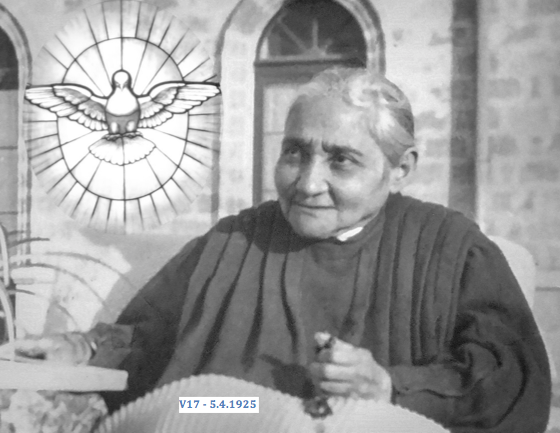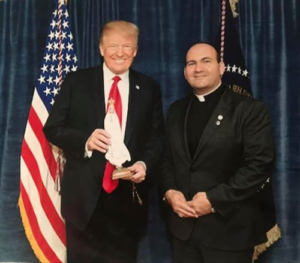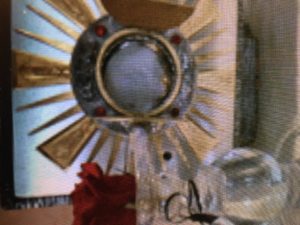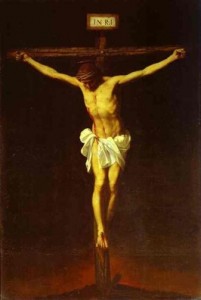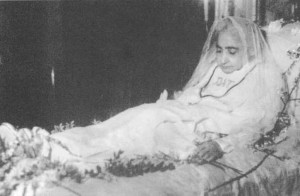[gview file=”https://luisapiccarreta.co/wp-content/uploads/2019/03/Who-is-the-Real-Enemy-2.pdf”]
The New Era from the Marian Movement of Priests Book
453 Rubbio (Vicenza, Italy); August 15, 1991
Solemnity of the Assumption
of the Blessed Virgin Mary into Heaven
The New Era
a “Today, beloved sons, contemplate me in the splendor of my glorified body, assumed into the glory of paradise. Live in joy and confidence the last times of this, your second Advent, by looking to me as to the sign of sure hope and of consolation.
b The new era, which awaits you, corresponds to a particular encounter of love, of light and of life between paradise, where I am in perfect blessedness with the angels and the saints, and earth, where you, my children, live in the midst of many dangers and innumerable tribulations. This is the heavenly Jerusalem, which comes down from heaven upon earth, to transform it completely and to thus shape the new heavens and the new earth.
c The new era, toward which you are journeying, is bringing all creation to the perfect glorification of the Most Holy Trinity. The Father receives his greatest glory from every creature which reflects his light, his love and his divine splendor. The Son restores his reign of grace and of holiness, setting free every creature from the slavery of evil and of sin. The Holy Spirit pours out in fullness his holy gifts, leads to the understanding of the whole truth, and renews the face of the earth.
d The new era, which I announce to you, coincides with the complete fulfillment of the divine Will, so that at last there is coming about that which Jesus taught you to ask for, from the Heavenly Father: ‘Your Will be done, on earth as it is in heaven.’ (Mt 6:10) This is the time when the divine Will of the Father, of the Son and of the Holy Spirit is being accomplished by the creatures. From the perfect fulfillment of the divine Will, the whole world is becoming renewed, because God finds there, as it were, his new garden of Eden, where He can dwell in loving companionship with his creatures.
e The new era, which is just now beginning, brings you to a full communion of life with those who have preceded you and who, here in paradise, enjoy perfect happiness. You see the splendor of the heavenly hierarchy; you communicate with the saints of paradise; you relieve the purifying sufferings of the souls who are still in purgatory. You experience, in a strong and visible way, the consoling truth of the communion of saints.
f The new era, which I am preparing for you, coincides with the defeat of Satan and of his universal reign. All his power is destroyed. He is bound, with all the wicked spirits, and shut up in hell from which he will not be able to get out to do harm in the world. Herein, Christ reigns in the splendor of his glorified body, and the Immaculate Heart of your heavenly Mother triumphs in the light of her body, assumed into the glory of paradise.
g This feast of mine, which bids you to look to your heavenly Mother, assumed into heaven, thus becomes for you a reason for deep joy and great confidence.
h In the midst of the innumerable sufferings of the times through which you are living, you look upon me as a sign of sure hope and of consolation, because I am the luminous door which opens upon the new era that has been prepared for you by the Most Holy Trinity.”
Fr. Andrew Mahana-Maronite -exorcised the White House.
Fr. Andrew Mahana-Maronite -exorcised the White House. He brought a statue of our Lady of Fatima and Trump asked to keep it when he first moved in.
For discernment…
2/27 Excerpt from Volume 11 – September 6, 1913
I was thinking about the Hours of the Passion which have now been written, and how they are without any indulgence. So, those who do them do not gain anything, while there are many prayers enriched with many indulgences. While I was thinking of this, my always Adorable Jesus, all Kindness, told me: “My daughter, one gains something through the prayers with indulgences. But the Hours of My Passion, which are My own Prayers, My Reparations and all My Love, came really from the depth of My Heart. Did you perhaps forget how many times I united Myself with you to do them together, and I turned chastisements into Graces over the entire earth? So, My Satisfaction is such that, instead of the indulgence, I give the soul a handful of Love, which contains Infinite Love of Incalculable Price. Further, when things are done for pure love, My Love finds Its Outpouring – and it is not inconsiderable that the creature can give relief and expression to the Love of her Creator.”
Newsletter #202 LCDW March 2019
[gview file=”https://luisapiccarreta.co/wp-content/uploads/2019/02/Newsletter-No-202-March-2019.pdf”]
Novena for the 72nd Anniversary of the Passing into Eternity of the Little Daughter of the Divine Will, Luisa Piccarreta
Click here for Novena
February 23 – March 4
